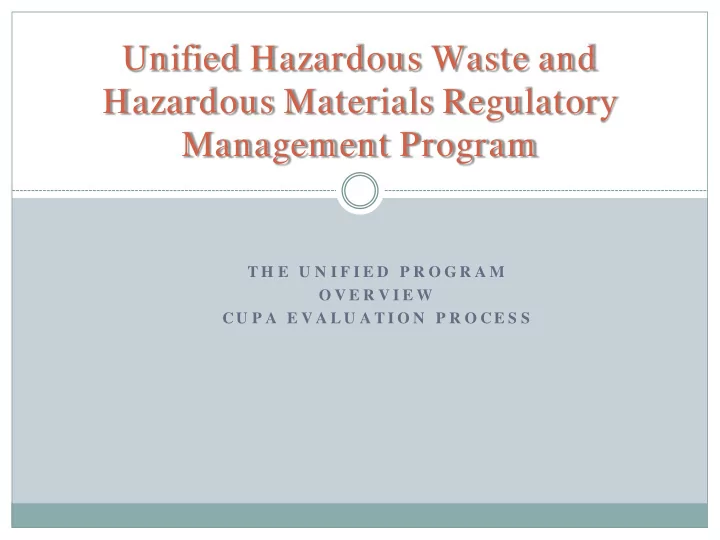

Unified Hazardous Waste and Hazardous Materials Regulatory Management Program T H E U N I F I E D P R O G R A M O V E R V I E W C U P A E V A L U A T I O N P R O C E S S
Background Brief SB 1082 (1993) created program Effective January 1, 1994 1 994-1995 UP regulations were developed Certification process from 1996 to 2004 Most CUPAs certified 1996 to 1998 13 Rural CUPAs certified 2001 to 2003 2 DTSC CUPAs designated in 2004
Certified Unified Program Agencies and Participating Agencies 3 Definition: CUPA & Participating Agency 81 CUPAs 54 environmental health agencies 21 fire departments 6 Other (DTSC, Air District, JPA, Planning Dept., Waste Mgmt.) 25 Participating Agencies 23 fire departments 2 LA County departments: PW & Ag Comm
Refer to handouts for detail
Regulated Universe 5 Total Regulated Businesses: 164,000 Chemical Inventory (HMBP) Facilities: 120,000* Accidental Release Prevention (CalARP): 2,300 Hazardous Waste Generators: 89,000 Large Quantity HW Generators: 3,500 ( 1,600 RCRA ) Underground Storage Tank Facilities: 14,500 Aboveground Storage Tank Facilities: 13,000 *There are 133,000 facilities in the system but 13,000 facilities have not submitted an chemical inventory. 02/ 04/ 15
Inspection Activity Statutory Cycles Annual – USTs 3 years – HMBP, CalARP, HW LQGs, HW TP, ASTs No Requirement (IAW I&E Plan) – HW Generators 241,000 routine inspections over past 3 years 86,600 HW Generators 82,500 routine inspections over past year 26,800 HW Generators Last year 31,500 HW violations at 11,400 facilities 10,060 Minor violations at facilities – 75.5% 7,300 Class 2 violations at 3,600 facilities – 23% 460 Class 1 violations at 340 facilities – 1.5%
Evaluation Process Identify CUPAs to be evaluated by year Collect information from CERS and CUPAs Analyze information ( interaction with CUPA as needed ) 1 st Evaluation Team meeting Determine oversight and/ or verification inspections Q&A Meeting with CUPA 2 nd Evaluation Team meeting Focused onsite visit needed? Complete evaluation report Formal letter sent Begin quarterly update See Graphic
Overall Picture of CUPAs 71 Satisfactory or better 10 Unsatisfactory 2013: Mendocino(R) 2014: Amador (R)(good progress), Santa Barbara, City of LA (acceptable progress) 2015: San Benito (R), Mono (R), City of Long Beach, City of Glendale, City of El Segundo 2016: City of Fremont 2 CUPAs almost satisfactory (LA City & Amador County) Primary reason for Unsatisfactory Lack of qualified staff resources Funding and demographics 1 or 2 person programs
Recommend
More recommend